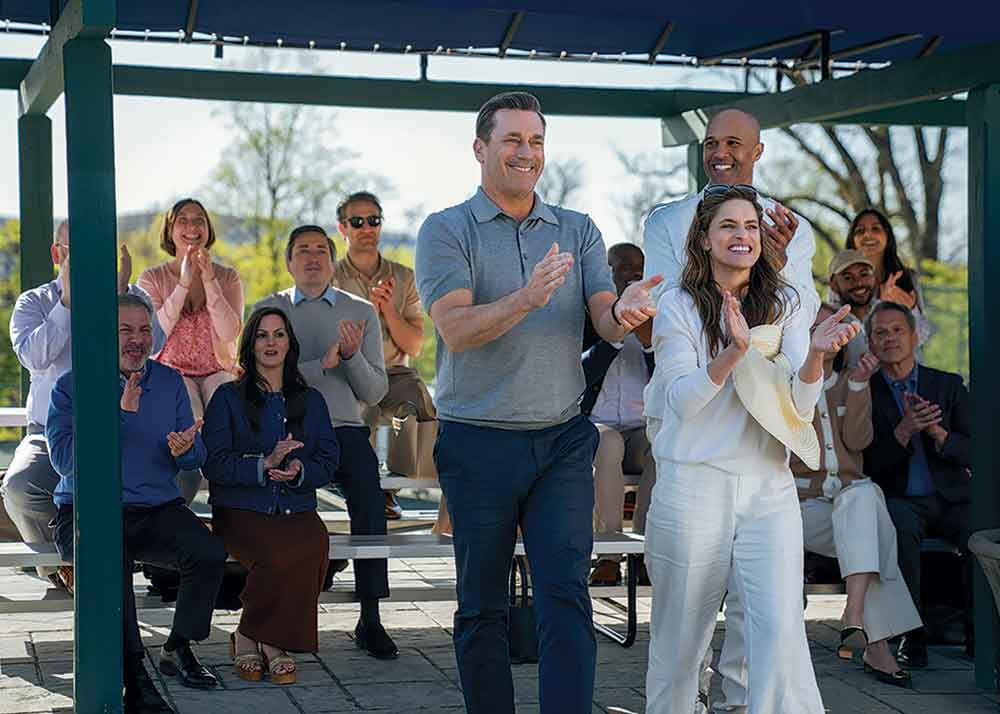Jon Hamm stars as a wealthy guy who turns to burglary when his life crumbles in Your Friends & Neighbors
When Andrew “Coop” Cooper (Jon Hamm) loses his job as a hedge fund manager, it is really just the cherry on top of an already crap cake. His ex-wife Mel (Amanda Peet) is in a relationship with his former best friend Nick (Mark Tallman), and the two live with Coop’s two teenage children in the family home, on Nick’s dime. So, when he’s dealt that one final blow, what’s a middle-aged man who needs to maintain a certain degree of wealth to do? In Your Friends & Neighbors, he starts stealing from his neighbours, of course.

As Coop’s coups go largely unnoticed, Jonathan Tropper’s series demonstrates the kind of prosperity most people only dream of. To Tropper, the show explores more than just obscene wealth. “What it’s really about is people who think they’ve reached the apogee of what they set out to do, only to realize that there’s a tremendous emptiness on having reached it. It’s a reflection on middle age and realizing that what you bought into as a promise wasn’t really a promise, it was just an idea,” he says. “It’s a glimpse at how fragile the scaffolding is to all the lives we build. There’s something that feels so permanent about big stone houses and fancy cars, and you assume people who have that stuff have it made, but two bad turns and you can lose it all.”

By having the series focus on someone like Coop, Tropper has created a manifestation of the American Dream and its vulnerabilities. “He is a guy who did everything right and therefore feels entitled to everything he has,” Tropper explains. “There’s a level of entitlement that we would both find contemptuous, but we would also relate to: I did well in school. I got the good jobs. I worked really hard. I married my college sweetheart. I built the family, I did everything exactly right. And I still ended up not only deeply unhappy but losing most of it. To me, he’s the paradigm. He’s the guy who, save for one or two events, probably could have sailed through the rest of his life, having mastered it.”

With the Mad Men star at the helm, Tropper felt he could depict all of the above with the kind of emotional depth that Coop required. “I always wanted Jon for this,” he says. “He’s a guy who with his essence always feels like a man who’s completely in control. He is able to convey a level of privilege and entitlement — and at the same time, when it all goes wrong and he’s enraged, he’s lost and he’s humiliated, you still believe him and you still want to go on the journey with him.” It is also not hard for an audience to feel for Hamm, even when he’s in the wrong, adds Peet. “There’s something about him that’s incredibly likable, and I think you could see it in Don Draper as well,” she says. “He had hubris, and there’s something about him that conveys this complicated, I don’t want to say vulnerability, but for some reason you sympathize with him.”

Although wrapped in a deadly whodunit and peppered with one unbelievable heist after another, what appealed to the cast about this series was the relatability of the characters and the humour in the writing. “The way that Tropper wrote this, it feels like there’s always something that’s just hitting Jon Hamm over the head — another bill, another betrayal, another moment where he’s got to face his ex-wife and his best friend — and it doesn’t stop,” says Olivia Munn, who plays Coop’s neighbour-with-benefits, Sam. “At the same time, there is all this humour, because it’s really the only way to keep rolling through it. Life really can get hard at times, and you just put on a smile and keep pretending that it’s not crumbling around you. And then either you get to the other side and you realize, ‘OK, I didn’t crumble.’ Or you get to the other side and you’re like, ‘I lost everything.’”

As he receives praise from his female cast members for his layered depiction of women and their respective crises, Tropper says every character on his show is created equal — for better or worse. “I don’t really think of them in terms of male and female. I think of them all as characters I’m going to screw around with,” he says. “The idea is that everybody has to be capable of being the star of their own show and nobody’s innocent. Those are my two rules. What is going to make people invest in this character? Why are people going to root for them? Why are we going to come back to them week after week and say you have to invest in them? To me, they’re all the same — it’s just about what makes them interesting, provocative and fun to watch.”
Your Friends & Neighbors streaming Friday, May 16 on Apple TV+
